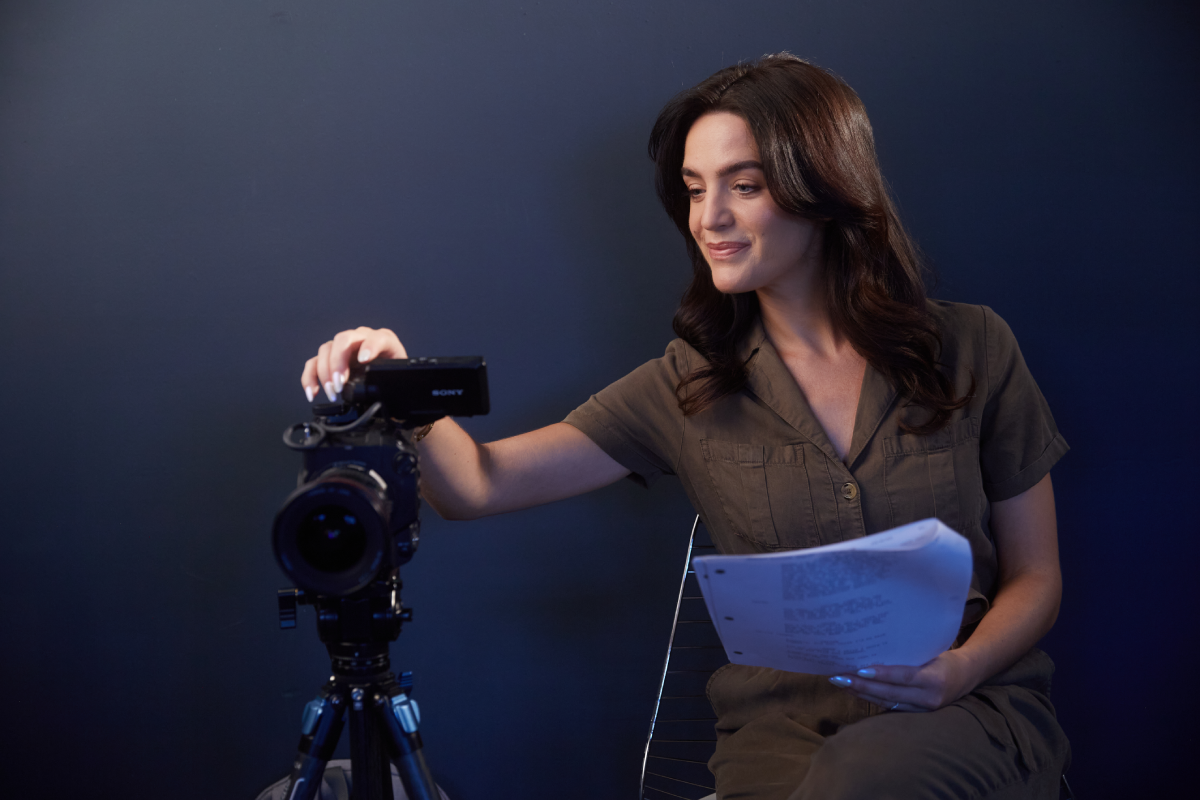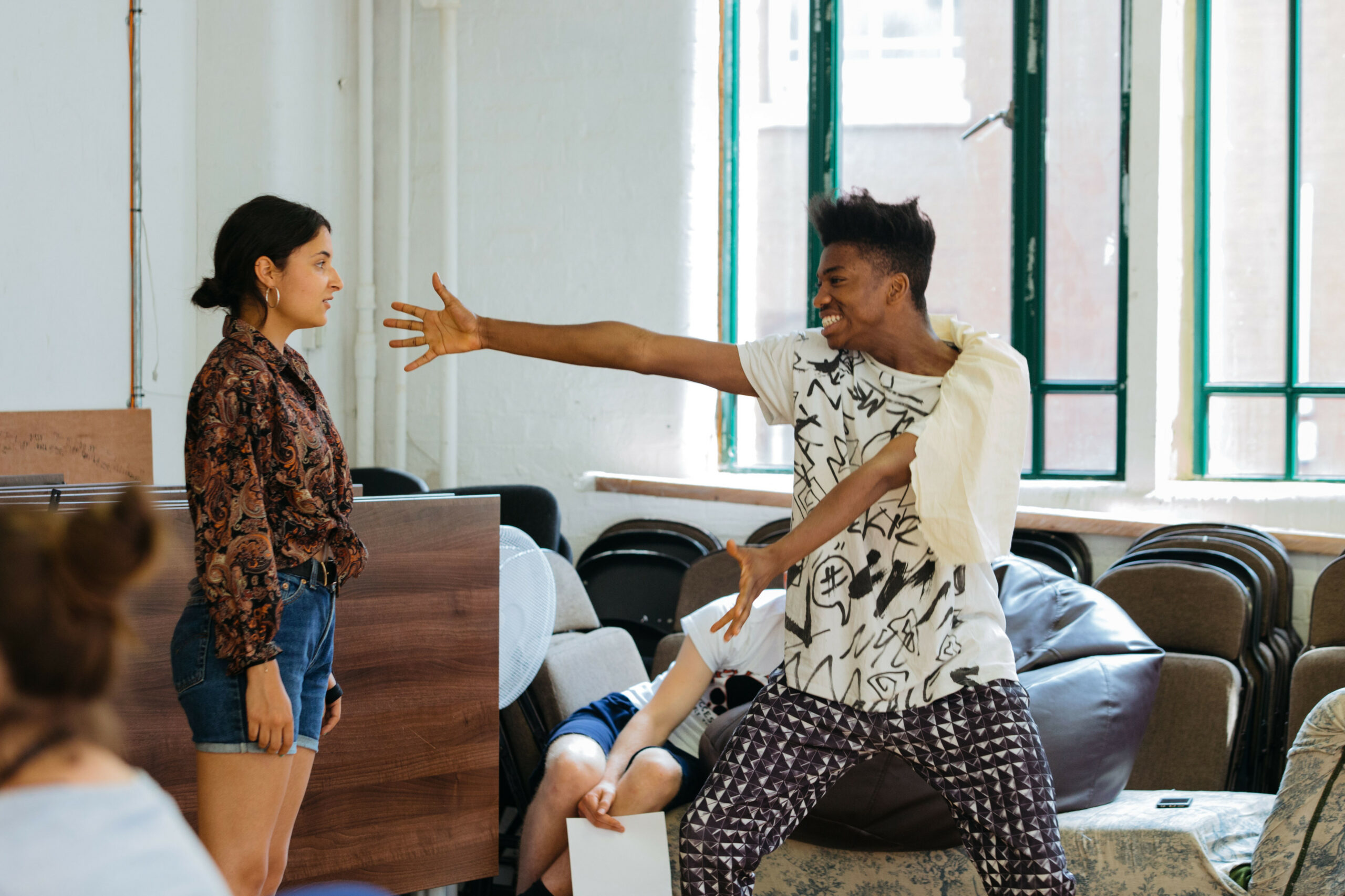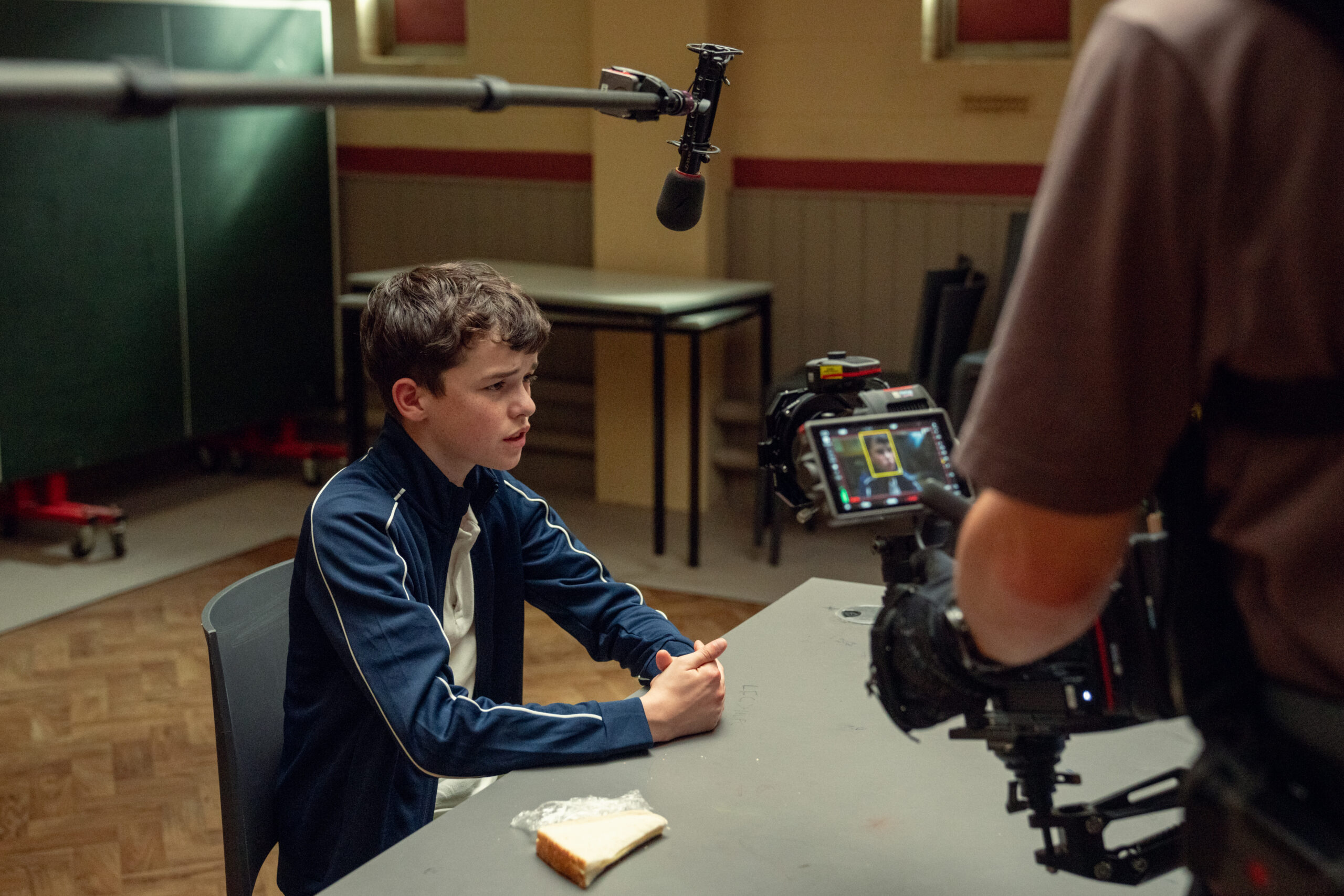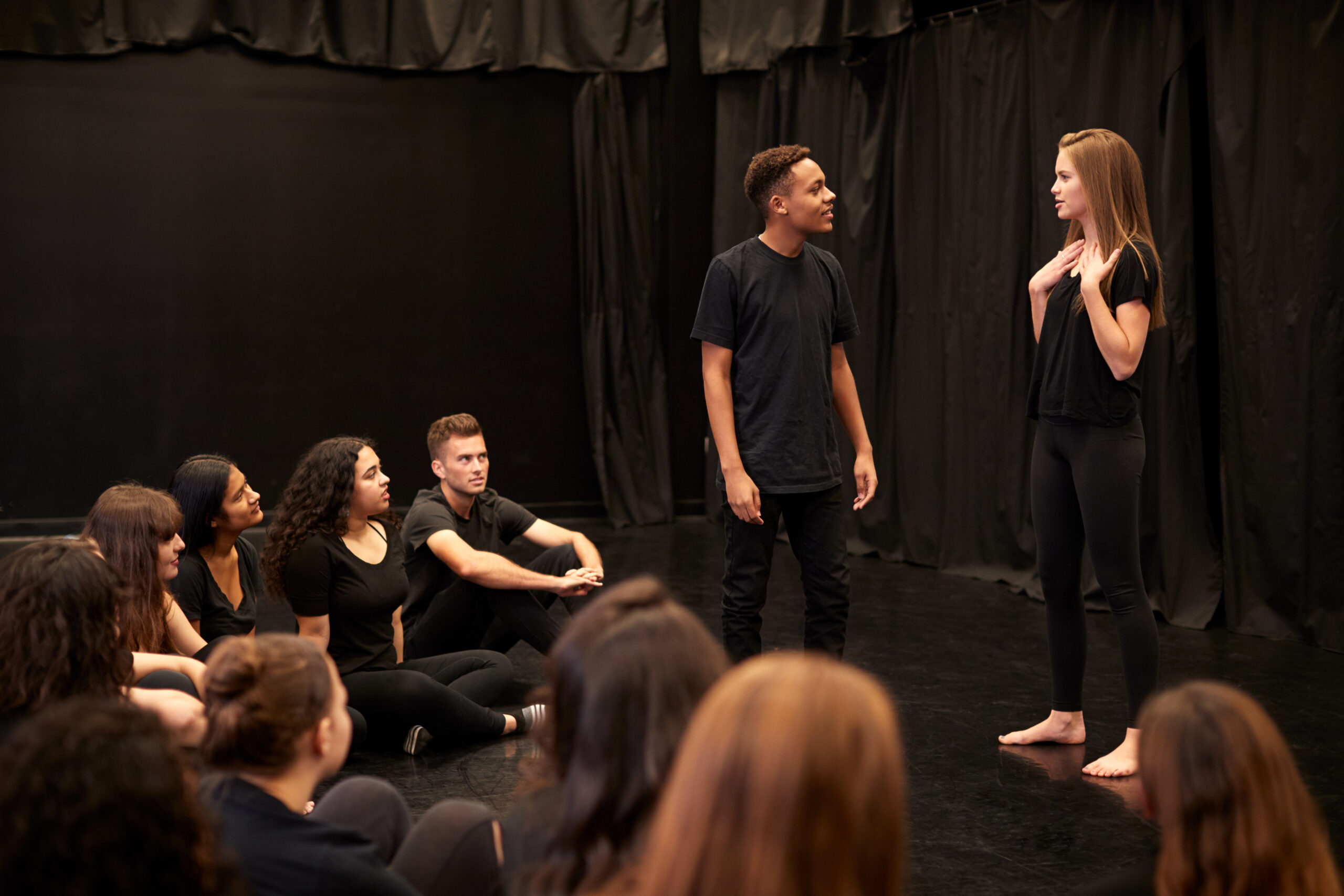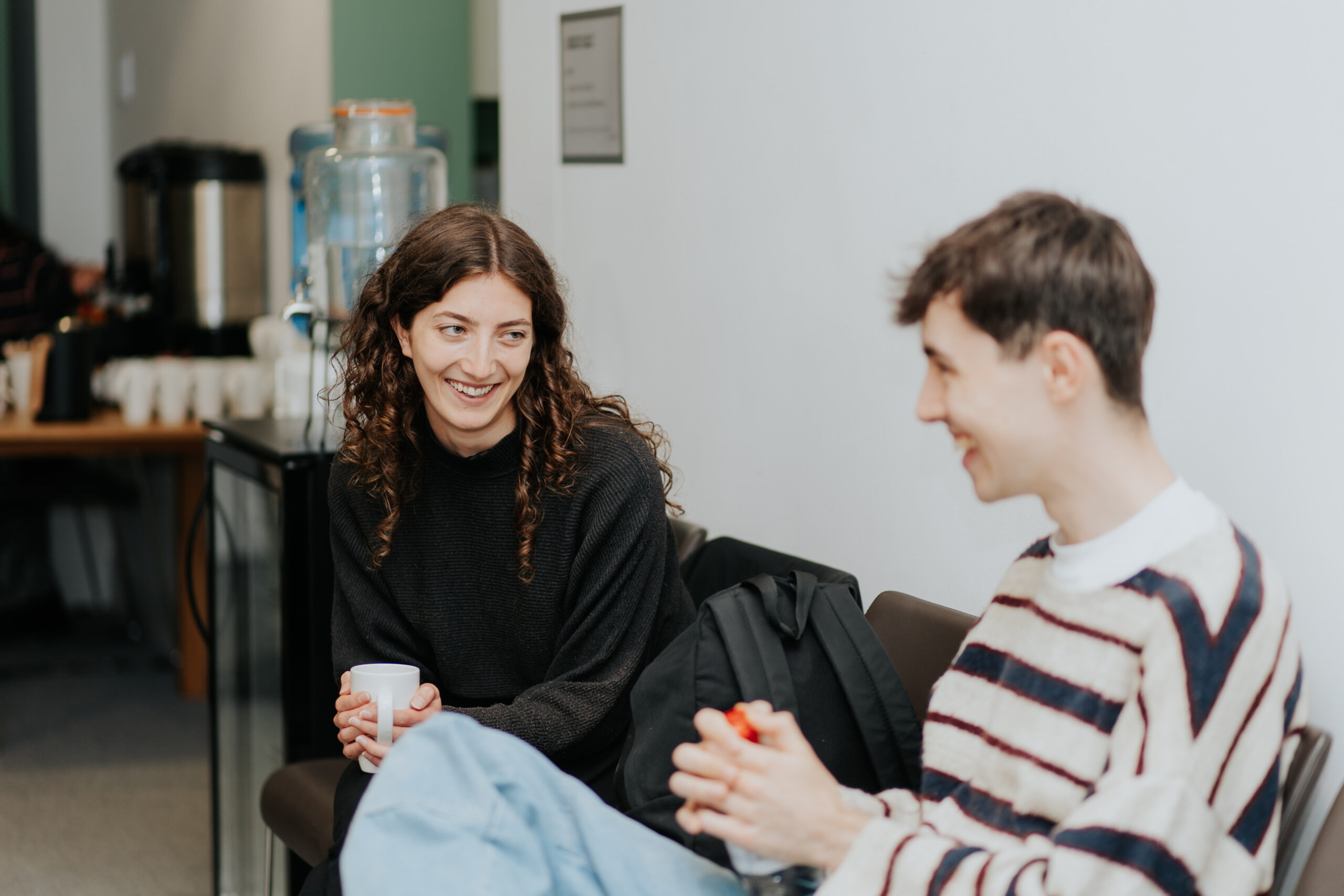An insight into the Playing Up course at the National Youth Theatre
The Playing Up course is an access to education course provided by the National Youth Theatre. It offers aspiring actors between the ages of 19 and 25 a 10-month training programme, specifically for young people not in education, employment or training. On completion, there is the opportunity to gain an Access to Higher Education Diploma in Theatre Arts, which is equivalent to 2 ‘A’ Levels.
We spoke to Joshua Asaré (21), Stephen Teelan (25), Rachel Pooley (24), Alice Amorim De Matos Vilanculo (23), Dionne Brown (21) and Abby Russell (20). This talented young bunch had plenty to say about what the course offers you, why it’s worth applying come April, and what you can expect from this great programme. Their final performance Three is at the Arcola from the 20th to 22nd July so take a look online to find out more!
We have an opportunity to play – I know it sounds cheesy. But we’re actors, we want to explore, we want to play and I’ve spoken to previous Playing Up members who went on to drama school or other training, where they don’t have the freedom to play as much as we do here. It’s a big blessing to also learn about the craft, but also learn what type of actor you want to be.
What made you want to pursue acting?
Dionne: It’s what I’m good at, and it’s fun.
Rachel: It makes you feel good, like you’re doing something that’s worthwhile – you’re good at something. At school, it was the only thing anyone told me I was good at. It makes you more confident as well, because I was a very shy kid.
What made you want to do Playing Up specifically?
Dionne: I did secondary school, went to college and did Performing Arts and then took a gap year. After the gap year I went to university and did Drama, but left the course. I didn’t agree with what I was being taught – I guess it’s ok for some people, I wouldn’t knock it, but I personally did not agree with the format I was being taught in. It was very theoretical, and drama isn’t, as far as I’m concerned. I wasn’t having fun, and drama is about playing, exploring and seeing what you can do next. It just became a bit too predictable for me. I didn’t like it so I left. I wasn’t really sure what I was going to do but one of my close friends was on this course already. He told me about it and that’s why I’m here.
Abby: I did secondary school, my A-Levels. Left, had a gap year. Didn’t really do much. When you’re having a gap year you kind of lose touch with drama, because adult classes are a bit rubbish sometimes and expensive. Where I was in Sheffield, there wasn’t really that much to do, unfortunately. You also make excuses. I was working in a Wetherspoons. Then I got into this course – I took the Megabus down the next day. It was an overnight decision that changed my life.
Joshua: I’d always heard about it but I couldn’t find much about it online. I didn’t know exactly what it was or how great it could be. I did secondary school, then half of college and then I just one day thought, “Why am I actually doing this?” I’ve got to this place now where I think if I’m not doing something I enjoy, the best thing is just to not do it and try something else. Which is why I’m here. I came across Playing Up because I am already a member [of the NYT]. I emailed Emily [Doherty, who teaches Playing Up] one day and asked if I could do it, she told me to come for an interview. I think she thought I wasn’t here to stay, but I’d already decided I was doing this course!

Stephen: I started at London Bubble Theatre Company first, then Soho Theatre, then Young Vic, then the Old Vic, then I found out about this course, Playing Up. I came for an audition, got the call and got on the course. I was bouncing around courses instead of going to drama school. I wanted to do this course so then I can do REP [at the NYT].
Rachel: After I left secondary school I went to college. They were always bringing in teachers to teach us new modules and stuff, and for one, they were talking about the National Youth Theatre. At the time I didn’t apply, I don’t know why. There were other things I wanted to do – I was auditioning for drama school, but once I didn’t get into any, I moved on to the London Bubble Theatre Company. Even at Bubble, NYT was always there. Eventually I found out how to apply for the course, I auditioned and the person who auditioned me was Sophie Ellerby – she thought I was really great. A few months later I got into the intake course for the summer and then they told me I should do Playing Up as well.
Alice: I did secondary school, went to college to study Media History and Theatre Studies. College was not a good time for me – academically, I just wasn’t really in it. But I finished, worked for a couple of years and realised I wasn’t really as involved with theatre as much as I wanted to be. I just thought, “Why am I doing these dead-end jobs? There’s something that I really enjoy and I’ve been told I’m good at, but I’m not entertaining that, I’m just living, earning money…” An ex-Playing Up member told me that there’s this course that would fit me and it’s really great. I nearly never came because I had this fear of auditions, but I did and here we are today.
It does give you a platform. Before I would have thought, “No way.” But now… I had no network or contacts before, and now I’ve got a lot. A lot of us are interested in making our own work.
What do you think you learned on the programme?
Abby: I’ve just learned about people, and myself. I know it sounds silly. I’ve learned a lot about my faults, habits, little things – I’ve been in situations I’ve never been in before. I moved as well, so living on my own… I wasn’t doing much in Sheffield but now I feel like I’ve really been learning a lot.
Alice: Confidence. We have modules that we go through, and I learned a lot about habits. Having had the fear of auditioning – I think I still have it, but I have strategies now, that we learned. There was this specific term where we focused on audition technique, which drilled some of those things in. We definitely learn to work with people who might have a very different lifestyle to you, or not the same background as you. Not even the same aims as you. I think it’s reinforced why I’m pushing for it now, it can be a bit uncomfortable and there are aspects of the industry where I think, “I don’t know if I agree with that.” In the end, you have to love [acting]!
Abby: Yeah, you have to love it. Now that I’ve done this I realise just how much I didn’t know. Before I thought I was acting, but now I realise I knew nothing. Just small things like learning how to properly tackle a monologue. If I’d have tried to go to a drama school, I’d have literally got a mirror, learned the lines. Now I know you’ve got to do intentions, etc. You’re becoming more knowledgeable because of the things you’re doing. I can look at the others and realise what they are doing too – I get a sense of what is going on in the industry.

Joshua: Also, with what Alice was saying before about the industry not being like the greatest place sometimes, and there being some questionable things… I think this course is like a microcosm of the industry as a whole, because we come in and there are some parts that we don’t enjoy that much. But it’s great that we all haven’t had a 100% positive time of it – when you get out there, there are going to be some people who you don’t like, we are going to be doing some things we don’t like at the beginning to get in the door, but it’s nice that we’ve got this chance to learn that now and we know then what to expect. None of us are going to be surprised.
Alice: We have an opportunity to play – I know it sounds cheesy. But we’re actors, we want to explore, we want to play and I’ve spoken to previous Playing Up members who went on to drama school or other training, where they don’t have the freedom to play as much as we do here. It’s a big blessing to also learn about the craft, but also learn what type of actor you want to be.
Joshua: And not just about acting, also just about life. Actors get a hard time for maybe being superficial. It’s not the kind of industry where if you’re nice it will get you far. You just need to always be aware that it sometimes isn’t fair. You’ve just got to deal with it. One day you’ll be in a room with people that all know that as well, and that’s when it can start to change. We have someone on this course who refers to themselves as non-gender binary. That is something that I thought I was very open-minded about and knew about, but obviously when someone has that identity you have to respect that. And if you haven’t met someone like that you don’t understand it totally – now that I’ve met them, I’ll know how to treat them and how to maybe even portray them in future.
Abby: I think there’s a similarly low representation of working class people [in the industry]. Majority of us are from that sort of background – we want to have our voice heard as well.
Know that this is an Access to Higher Education course, but that it’s not as naff as all the other ones. It’s practical and it’s in London – we had Paterson Joseph in earlier! It’s proper… Just know that it’s access to doing something else, whether it’s making your own work or making connections or going to drama school. Whatever you want to do with it.
What would you like to tackle next, once you finish the Playing Up course? Do you plan to make your own work?
Dionne: Holiday first. Remember to live, then act.
Rachel: I would like to continue at the NYT, definitely do more projects here, then the REP.
Alice: If jobs come, that’s a blessing, but for me personally, after being in this course, I just sort of want to go into other fields in the arts as well – it’s given me a taste of other things, but the main focus will be acting and training and hopefully REP!
Do you feel working with the NYT has given you access to a network or resources to help you achieve that?
Abby: Definitely – even the other day I was with [Sophie Ellerby], and she told me I could always come to her and talk through ideas. It does give you a platform. Before I would have thought, “No way.” But now… I had no network or contacts before, and now I’ve got a lot. A lot of us are interested in making our own work.
Alice: It’s just finding the time now to do it!

What’s been the highlight of this experience?
Abby: The people.
Rachel: Even if we can get on each other’s nerves…
Dionne: But that’s love though, isn’t it?
Abby: I call them family – I see them as family now. That bond when you’re doing such intense work with people.
Joshua: As an actor that is something that we crave – like when you get to be part of a company. We’re all together, and before we started rehearsing [for Three] we’ve had a long while to get to know each other. That’s something you don’t get a lot. Sometimes you’re just going to meet people you’re going to work with on the first day of rehearsal, but we’ve got a connection now. Something like this just closes the degrees of separation – we know loads of people through NYT, through knowing any one person here.
It doesn’t mean that just because you do this course that you have to be an actor. You might discover that you want to be a writer or a facilitator… It’s a great opportunity, and if you don’t know what to do [but you enjoy acting], just do this and you never know where the path will lead.
Do you have any advice for others considering this course? Or other young performers wondering what to do next?
Joshua: Know that this is an Access to Higher Education course, but that it’s not as naff as all the other ones. It’s practical and it’s in London – we had Paterson Joseph in earlier! It’s proper. You can go to drama school afterwards if you want. Something that I’ve noticed in drama school auditions this year is that rejection doesn’t hurt as much, I have this to come back to. A couple of years ago it felt like the end of the road.
Alice: And Playing Up provides the means to go to drama school.
Joshua: Yeah that’s the other thing – they help with auditions and stuff, I’ve saved hundreds of pounds. Just know that it’s access to doing something else, whether it’s making your own work or making connections or going to drama school. Whatever you want to do with it.
Stephen: I would say the same: Just try it. It doesn’t mean that just because you do this course that you have to be an actor. You might discover that you want to be a writer or a facilitator… It’s a great opportunity, and if you don’t know what to do [but you enjoy acting], just do this and you never know where the path will lead.

Rachel: I would say just join every youth group going – you’ve got to have your fingers in every pie. Be open to everything.
Alice: I would say if you are like me and you were struggling to get out of your house, just go: you never know, this might not be for you but you will learn something. Whether it was something you were intending to learn or not. I think it’s a great course that a lot of people can benefit from, it’s very accessible and it provides you with many opportunities – some that you would never think you’d get. It’s a good starting point, definitely. If you’re wondering, just go for it – there’s nothing you can lose. Not even the travel!
Dionne: Do your research. You can google things and get a lot of results, but ask questions – if you’re able to go to a theatre and speak to the receptionists, just ask questions. Relax, you’re young – don’t stress so much. There’s a lot of comparison [in this industry]; I might do a monologue and think, “Alice didn’t do it that way,” but Alice is doing Alice, and I am doing Dionne. I can’t do it how she did, that’s not going to change. Just focus on yourself, do what you can do. It’s not a competition, it’s not a race. We’re all going to get to different spots at different times; Abby could get there in 10 days and I could get there in 10 years. If that’s the way it has to be, then that’s the way it has to be. Take your time.
Abby: You know sometimes when you’ve got your head set on something? When I was in Sheffield I auditioned for this thing and I was dead set that I was going to be in it and it would be absolutely amazing. Then I got the email that I didn’t get it and I thought, “Oh my god.” A few days later I got a call for Playing Up. If you think you’ve got your head down one route, it might not be the case – something might pop up. I describe this as the golden ticket – it has been that for me. It’s been living the dream, moving here. Don’t focus too much on the practicalities of it. My mum was saying, “Abby, come on, you’re going to have to live on your friend’s sofa, it’s not going to work.” But I thought, absolutely. Just do it.
Alice: And we have a lot of fun.
Dionne: When you think about some of the laughs we’ve had! The fun we’ve had.
Alice: We play at Playing Up.
The Playing Up students will be performing Sophie Ellerby’s Three from the 20th to the 22nd of July. Book tickets now to watch this talented bunch in action at the Arcola!
Image credits: Helen Murray














